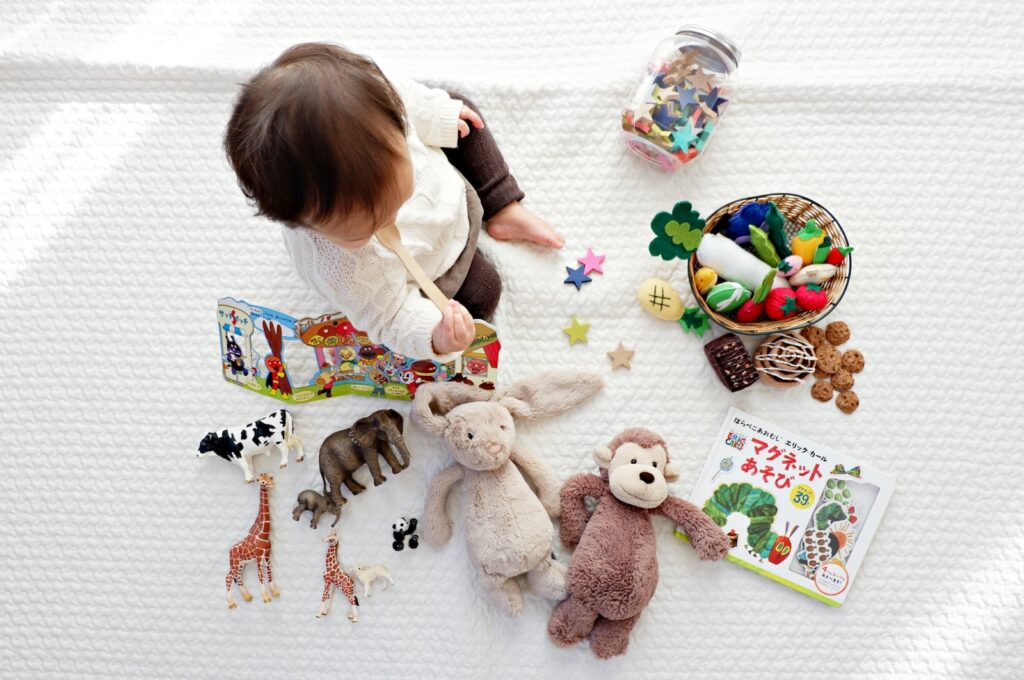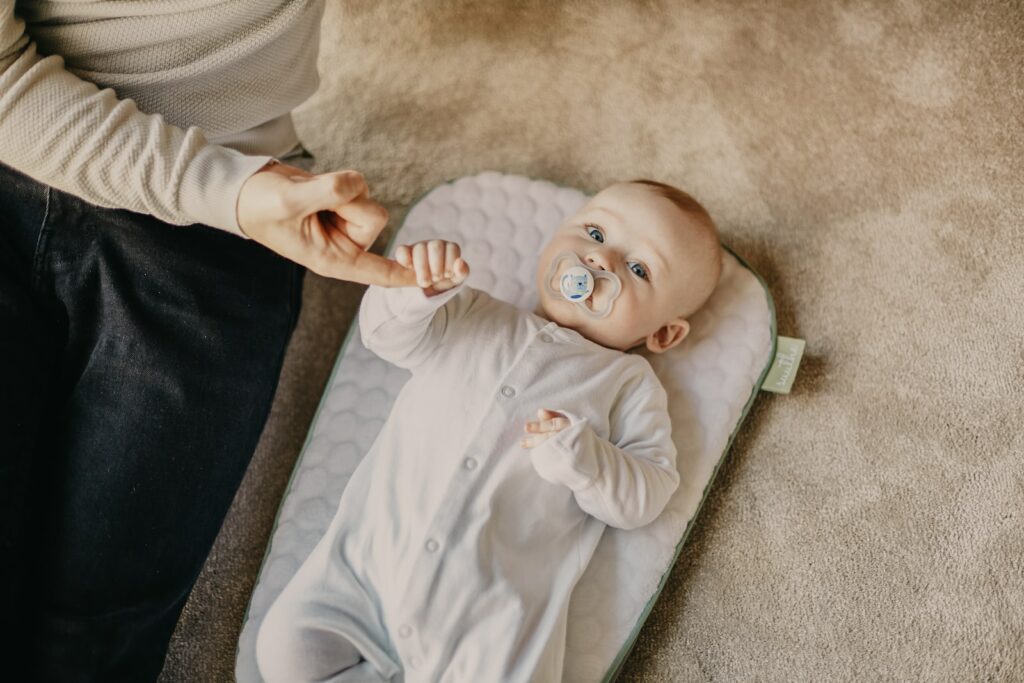Rather than sleeping throughout most of the day as your 8-month-old baby did just several weeks ago, your curious, bubbly little one is now most likely awake for longer periods and sleeping longer during the night.
However, you need to be aware that your baby still requires enough daytime naps and nighttime sleep; otherwise, they’ll end up cranky and overtired.

Even though no bedtime routine fits every baby, most eight-month-olds have relatively similar sleeping needs. At eight months of age, your little one can experience sleep disturbance, even if they didn’t before.
So, how much sleep is enough for an 8-month-old?
Generally, eight-month-old babies will need at least 14 hours of sleep per day. The 14 hours are broken down into two daytime naps and 11-12 hours at night.
How Much Sleep Does Your 8 Month Old Baby Need?
An 8-month-old baby needs at least 14 hours of total sleep in a 24-hour period, which usually breaks down to 11-12 hours of sleep during nighttime and 2-3 hours of sleep during daytime over two or three naps.

Most babies of this age nap for one to two hours, but some can sleep for as little as 30 minutes or have one long three-hour nap instead of two shorter ones. An 8-month-old baby needs 2.5-3.5 hours of awake time in between sleep periods.
At 8 months of age, most babies will drop their third nap and move to a two-nap schedule. Once your little one has dropped the third nap, you’ll need to have an early bedtime if you want to limit the fatigue caused by this nap transition.
Make sure to have a longer bedtime routine before you put your little one to sleep because this way you’ll help cue that it’s bedtime rather than a third nap.
Example Sleep Schedule for an 8 Month Old Baby
Setting up an 8-month-old baby’s sleep schedule is essential for establishing healthy sleep habits. Ideally, you need to begin the bedtime transition at least one or two hours earlier, depending on your little one’s personality and family schedule. Here are some ways to prepare your baby for bed:
- Warm bath. This can help them relax, and the decrease in their body temperature after the warm bath signals the brain that it’s sleep time. You can also boost the sleep-inducing effect by using a lavender-scented body wash.
- A good night story. Repetitive and short stories are perfect and help lull your little one to sleep.
- Calming lullabies. Singing a particular calming song to your 8-month-old baby every night before going to bed can signal them that it’s time to go to bed. You can also get a playlist with your baby’s favorite lullabies, which will keep the music playing until they fall asleep, and you don’t even need to be in the room.

Here is an example of a sleep schedule for an 8-month-old baby:
7:00 – Wake up your little one, it’s time for breastfeeding or formula-feeding;
8:15 – Breakfast, eating solid foods;
9:00 – It’s time for morning napping (approximately for an hour);
10:00 – It’s time for breast milk or formula;
11:00 – Lunch, eating solid foods;
12:30 – It’s time for breast milk or formula;
13:00 – Early afternoon nap (approximately for an hour);
14:00 – It’s time for breast milk or formula;
16:00 – Optional cat nap (approximately for 30 minutes);
16:30 – Dinner, eating solid foods;
18:15 – Begin with your bedtime routine
19:00 – Breastfeeding or formula-feeding and sleeping.
This sleep schedule can be changed according to your baby’s sleep needs, or you can consult a pediatric sleep consultant who can help you make a custom sleep schedule for your 8-month-old baby.
8 Month Sleep Regression
Sleep regression can include intense fussiness at bedtime or naptime, fighting sleep, frequent night wakings, and shorter naps.
Sleep regression is common at four months of age and eight months of age. However, even 12-month-olds (one-year-old) and babies at 18 months of age have been known to further regress in their sleep cycles.

While other problems can cause disturbance in your baby’s sleep habits, you can make a difference between other sleep disruptions and sleep regression based on when it occurs, whether there are any other problems, and how long it lasts. That being said, just because sleep regression occurs in some babies, it doesn’t mean that they’ll always happen.
You might ask yourself: how long will my baby’s sleep regression last? It might seem like forever, but sleep regression lasts approximately 3-6 weeks in most cases.
If your baby’s sleep problems are resolved quicker, it’s most likely that your little one was troubled by other temporary causes, such as illness, teething, changes in schedule, rather than having a real sleep regression.
Sleep regression in an 8-month-old baby can be caused by a change in sleep patterns and overall sleep needs or a developmental leap.

At eight months of age, your baby is developing rapidly, and their speaking skills are rapidly expanding. These mental developmental milestones can result in sleep disruptions as your little one tries out their new skills or has a busy mind. The transition to two naps instead of three can also be the culprit.
Can An 8 Month Old Baby Be Sleep Trained?
By this age, most babies are able to sleep throughout the night with no need for food or being soothed using other methods.
However, it’s quite normal for some babies to want additional nighttime breastfeeding if they’re teething or ill, and you need to consult your pediatrician or healthcare professional before you completely stop breastfeeding during the night.

If your 8-month-old isn’t ready yet, and you want to sleep more, you can try sleep training. Pediatricians often recommend sleep training after your little one turns six months of age when they’re developmentally capable of sleeping throughout the night without breastfeeding or eating and are able to put themselves to sleep.
It’s quite okay to try sleep training when your little one is eight months old or even 12 months old, but you need to remember that it can be difficult and may take a while.
By now, an 8-month-old baby really loves their snuggles and snacks in the middle of the night, and they can protest if you wean them off. However, if you stick to your plan for sleep training, your baby will eventually get used to it.
8 Month Old Baby Sleep Problems
No matter whether your 8-month-old sleeps throughout the entire night or not, it’s quite normal to have a rough period from time to time. Here are a few common sleep problems:
- 8-month-old sleep regression. Babies at this age are prone to sleep regression because they’re practicing their new skills, including pulling themselves up, speaking, and crawling. Separation anxiety can be a cause, as well.
- Teething. Teething can be a cause of frequent wakings and discomfort.
- Not falling asleep by themselves. By eight months of age, your baby doesn’t need you to feed or rock them to fall asleep. That said, old habits die hard, particularly if your baby is in the torments of separation anxiety. But don’t worry. Over time, your little one will learn how to self-calm themselves.
- Looking for a snack in the middle of the night. At this age, your little one doesn’t need midnight snacks. However, if your baby is used to these snacks they may not want to give up on them. In this case, you might try sleep training.
- Waking up early in the morning. Babies are early risers by nature. However, if your little one starts waking up regularly early in the morning, you need to change their sleep schedule.
- Other short-term sleep disruptions. Travel, sickness, and some huge shifts in your sleep routine can have an impact on your little one’s sleep. However, when your life gets back to normal, your baby’s sleep will, as well.
Sleep Tips for 8 Month Old Baby
An 8-month-old baby still needs a lot of quality sleep, but sometimes putting your baby to sleep can be quite challenging. Therefore we’ve decided to give you some sleep tips in order to help you and your little one to get enough sleep:

- Practice a consistent bedtime routine. In your bedtime routine, you must include a warm bath, final night feeding, and some activities that will relax your baby, such as snuggling, singing lullabies, or reading bedtime stories. The main point of this all is to assist your little one to go to bed and indicate that it’s bedtime.
- Make sure your baby gets enough sleep. Remember, an overtired baby has a difficult time settling down and a very good chance for night wakings. So, make sure to put your baby early in bed so they can get enough sleep every night.
- Don’t let your little one sleep too much. We all know that children require a lot of sleep. However, there is a chance of overdoing it. Limiting your baby’s daytime sleep at approximately 4 hours can be helpful for your baby to get a good night’s sleep.
- Keep within bounds on-the-go naptime. Your little one is going to have a better nap if they have a consistent, comfortable place to sleep. Moreover, having enough sleep throughout the day can help your baby to have a good night’s sleep. Don’t take us wrong, it’s okay for your baby to occasionally nap in their stroller, but it’s wrong if you make a habit of it.
- And the most important thing, be consistent. Every baby is disposed to sleep disruptions. It’s quite okay to reply to the wake-ups of your baby with a rub on their back or calm talk. However, don’t do anything that your little one might find fun, such as taking your baby out of their bed or rocking. These types of habits are very difficult to break.
FAQs
What time should a 8 month old go to bed?
Generally speaking, an 8-month-old should go to bed between 6:00 and 8:00 pm. This gives them enough time to wind down and have a good rest. It is recommended to give them a set bedtime routine, such as reading stories, having a warm bath, dimming the lights and cuddling up for the night. Putting your child down in their crib for sleep at the same time each evening can help establish healthy sleep patterns. It is also important to remember that babies at this age usually take three naps throughout the day—so these nap times should be taken into account when deciding what time should be considered “bedtime” for an 8-month old.
How long can an 8 month old stay awake?
An 8 month old baby usually needs 12-15 hours of sleep per 24 hour period. It is normal for 8 month olds to be awake for 2-3 hours between naps and have a few awakening during night. An 8 month old can stay awake for up to 4-5 hours, allowing time for feeding, playing, learning activities and social interaction. After this amount of time however, they need some rest as their bodies are still developing and they are not able to stay awake too long without feeling fatigued.
How to get 8-month-old to sleep through the night?
To get an 8-month-old to sleep through the night, it is important to establish a consistent nightly routine. This could include giving the baby a warm bath, and softly singing lullabies in the dark. Be sure to give him/her some cuddle time before bed as well. Additionally, encourage your newborn to self-soothe by establishing a word or action that he/she can recognize when it’s time for sleep. Together, you’ll work on building positive sleep associations so that your 8-month-old can achieve better quality sleep at night more consistently.
What is the wake window for 8 month old?
The wake window for an 8 month old is approximately 11-12 hours per day. This means that the 8 month old should have 3-4 naps throughout the day, each lasting around 1-3 hours. In between these naps, the infant should be awake and alert for about 1.5 to 3 hours at a time during different times of the day. It is important for parents to establish a consistent waking routine so that their baby can learn how to easily fall asleep in the evening. Additionally, it is important for 8 month olds to get adequate sleep as this helps with their overall growth and development.
A Few Words Before You Go…
No matter what happens with your baby’s sleeping habits, you must also schedule plenty of rest for yourself.
Creating a good sleep schedule for your little one requires a willingness for trying new things, consistency, and plenty of patience, and it will be easier to have all of these things if you yourself take naps and breaks from it all.
While refusing to nap or not sleeping through the night can be quite frustrating for both you and your 8-month-old baby, remember that every baby eventually stops waking up in the middle of the night as they approach their first year of age.
Article Sources
- Scher, A. (2005). Crawling in and out of sleep. Infant and Child Development: An International Journal of Research and Practice, 14(5):491-500. https://onlinelibrary.wiley.com/doi/abs/10.1002/icd.427
- Paavonen, E. J., Saarenpää-Heikkilä, O., Morales-Munoz, I., et al., (2020). Normal sleep development in infants: findings from two large birth cohorts. Sleep Medicine, 69:145-154. https://www.sciencedirect.com/science/article/abs/pii/S1389945720300381
- Martins, R. M., Oliveira, J. R., Salgado, C. C., et al., (2018). Sleep habits in infants: the role of maternal education. Sleep Medicine, 52:138-144. https://www.sciencedirect.com/science/article/abs/pii/S1389945718306968
- Gordon, M. (2018). From Safe Sleep to Healthy Sleep: A Systemic Perspective on Sleep In the First Year. https://depts.washington.edu/nwbfch/infant-safe-sleep-development
- Sadurní, M., Burriel, M. P., & Plooij, F. X. (2010). The temporal relation between regression and transition periods in early infancy. The Spanish journal of psychology, 13(1):112-126. https://pubmed.ncbi.nlm.nih.gov/20480682/






